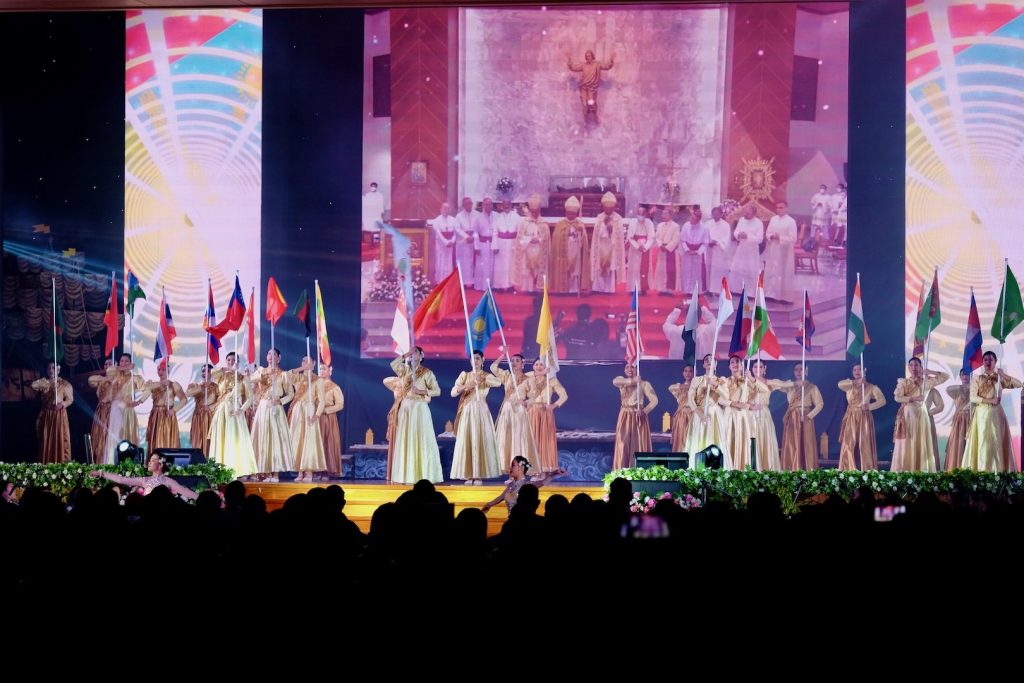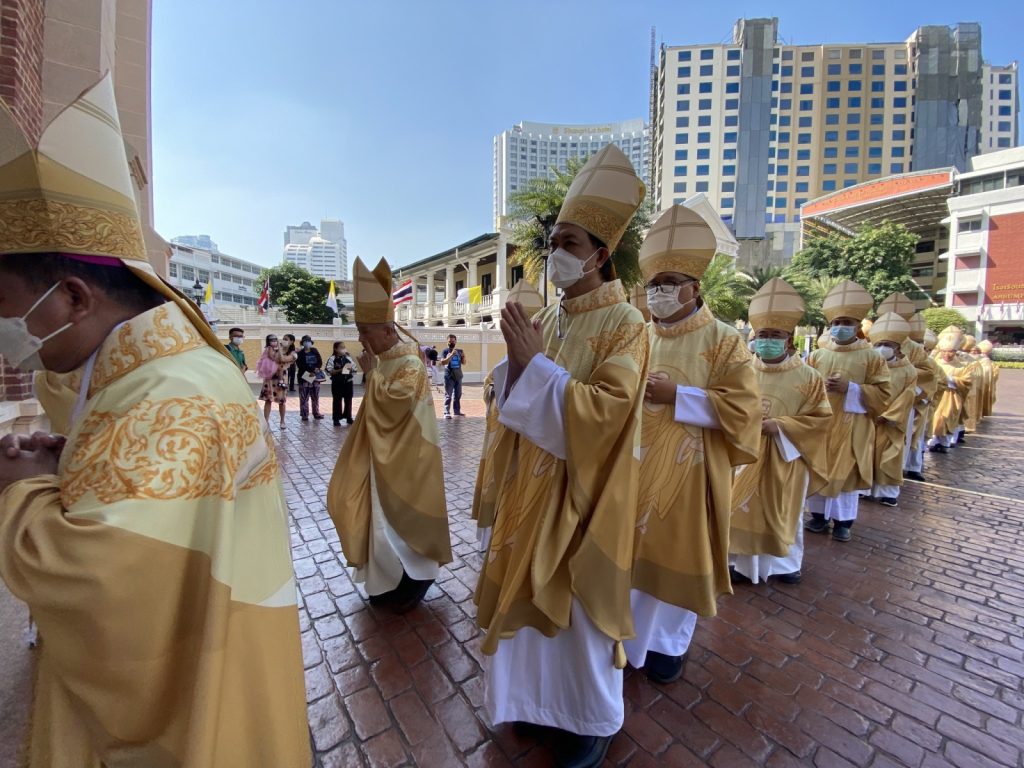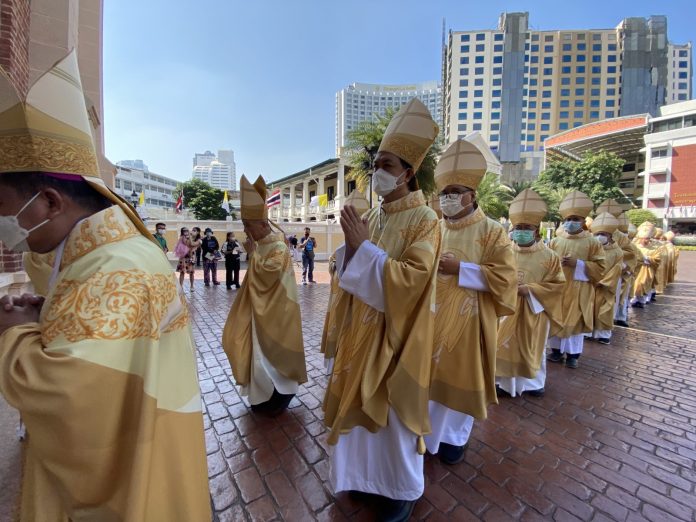Asia’s Catholic leaders called on Churches across the region to launch “pastoral actions” to address challenges facing Asia, such as the climate crisis and the situation of migrants and refugees.
In its “final document” following its general conference in Thailand in October, the Federation of Asian Bishops’ Conferences (FABC) urged Churches and Church leaders to go “off the beaten track” and to “face new pastoral priorities.”
The document was presented online on Wednesday, March 15, five months after the general conference in October to mark FABC’s 50th year.
The so-called “Bangkok Document” brings together reflections shared by participants of the conference, an event that Cardinal Charles Maung Bo of Yangon, FABC president, described as “a watershed for the journey of the Churches of Asia.”
He said the gathering in October that brought together 226 lay people, consecrated men and women, priests, bishops, archbishops, major archbishops, and cardinals from 17 episcopal conferences and two synods of Oriental Churches in Asia was “a dialogue in solidarity and collegiality.”
Cardinal Bo said the “Bangkok Document” aims to translate into the life of the communities the discussions during the meeting that carried the theme “Journeying together as Peoples of Asia.”
The document invites the Church in Asia to return to the people “by another road” like what the Wise Men who came from the East did after meeting with Jesus in Bethlehem.
Cardinal Oswald Gracias, archbishop of Mumbai, said the document is a text for Churches across Asia “to reflect, pray, and choose their own priorities.”
“I think that, as was the case with the Aparecida Document in Latin America, it will be the point of reference for our communities for the next five or ten years,” said the prelate.
The “Aparecida Document” is the final document of the 5th General Conference of the Episcopate of Latin America and the Caribbean, which met in May 2007 on the theme “Disciples and Missionaries of Jesus Christ so that our peoples may have life in Him. ‘I am the Way, the Truth and the Life’ (Jn 14:6).”
Cardina Gracias said the “Bangkok Document” is “an indication of the direction in which to work in order to be a Church for a better Asia and a better world,” adding that it is “the mission that God has assigned to us.”

Synodality and pastoral presence
The document, which was drafted by a committee led by Bishop Pablo Virgilio David, president of the Catholic Bishops’ Conference of the Philippines, is divided in five chapters that focus on “synodality,” the emerging challenges in Asian society, the responses to the pastoral challenges, the relationship between the Churches of Asia and the universal Church, and the pastoral presence of the Church in Asia.
The five chapeters of the 40-page document are titled: “Journeying together,” “Looking at Asia’s emerging realities,” “Discerning what the Spirit is saying to the Church in Asia,” “Offering Our Gifts which are Asian Culture and Spirituality,” and “Opening New Pathways.”
“Journeying together” discusses issues on how to respond to the “call of synodality.” It talks about the “three essential elements” of a synodal church, that is, Communion, Participation, and Mission.
The second part of the document looks into Asia’s emerging realities and the challenges confronting the Church in Asia. The document identifies challenges, especially those pertaining to:
- Migrants, refugees, and Indigenous People
- Families who are the bedrock of society
- Gender Issues confronting the Church and Society
- The role of women in fast-changing Asian societies
- Youth confronting a new world
- The impact of digital technology
- Promoting an equitable Economy in the face of Urbanization and Globalization
- The Climate Crisis, which endangers Our Common Home
- Interreligious Dialogue
The document urges Churches to undertake pastoral action, from attention to the family to leadership roles for women in ecclesial communities.
Churches are also urged to be more conscious in the use of digital technologies and to be “bridges of dialogue and reconciliation.” They are also called to undertake formation courses for the clergy in the context and culture of Asia.
The document also identifies “new paths” that Churches of Asia will follow in its work for evangelization, including a transition “from a paradigm with a dominant model to a truly inculturated approach.”
Basic ecclesial communities are invited to “widen the stakes of their tent” and become realities that also look beyond borders to broaden relationships with men and women of every confession.
In ecclesial life, a “qualitative leap” from dialogue to “true synodality” is suggested, while in the proclamation of the Gospel, there should be a transition from “abstract proclamation” to the “telling of stories of faith incarnated in life.”

Commitment to the poor
During their meeting in October, Asia’s Catholic Church leaders committed themselves to “positively respond to ‘both the cry of the earth and the cry of the poor.’”
In a message to the “Peoples of Asia,” the Church leaders said they were “challenged by the different voices of our multifaceted continent that we hear crying out for help and justice.”
In a statement, they said they were able to “touch the soul of Asia” during their series of meetings and consultations held in the outskirts of the Thai capital from October 12 to 30.
“We were inspired by the hope, courage, and determination shown by the Churches in Asia to journey together and work with more dedicatedly for a better Asia,” read the bishops’ statement.
They said that “in prayer and in a spirit of collaboration,” they want to respond to the challenges being faced by the region “by relying on the power of love, compassion, justice, and forgiveness.”
“We believe that peace and reconciliation is the only way forward,” the said, adding that they have “envisaged new pathways for our ministry based on mutual listening and genuine discernment.”









